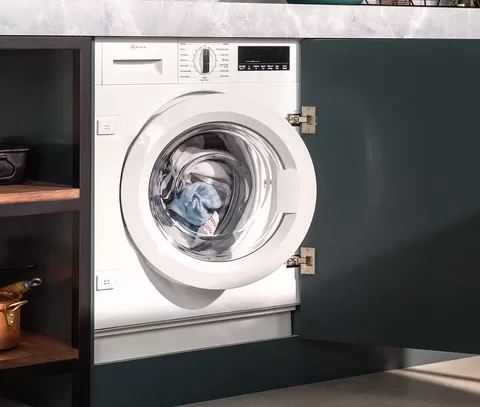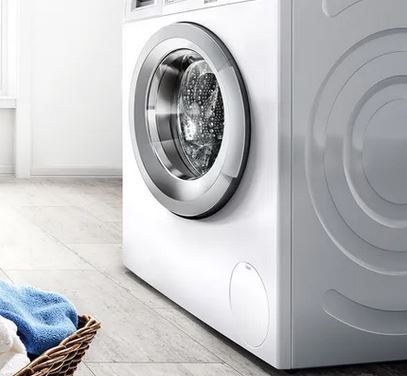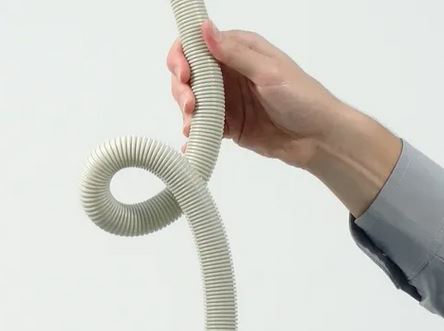Bosch washing machines are best described as next-level, and that’s mainly due to their reliability, washing efficiency, and outstanding performance. But even so, these washers occasionally fail, and one issue you might face is a Bosch washer not spinning clothes dry, which means soaking wet laundry at the end.
Mostly, the Bosch dishwasher won’t spin clothes dry due to an improperly latched door/lid, power issue, wrong wash setting, washer imbalance, poor loading, excess suds, poor drainage, or broken drive belt.
This guide shall discuss the eight issues, their probable triggers, and how to fix them and get your washer back to spin-drying. The beauty is that you can fix the problems yourself, saving yourself from paying the repairer or having to wait in line for days for Bosch to send someone over.
Let’s get started!

In a hurry? Check below for a quick guide to why your Bosch washer leaves clothes soaking wet and what to do.
Bosch Washer Not Spinning Clothes Dry – Quick Troubleshooting Guide
| – | Likely Cause | Quick Fix |
| 1. | Improperly latched door/lid | Remove clothing obstructions and firmly shut the lid. Replace the lid switch if it fails to pass the multimeter continuity check. |
| 2. | Power Issue | Check your Bosch washer’s power supply. Ensure there’s adequate power. |
| 3. | Wrong Wash Setting | Choose a wash setting that matches the load type. |
| 4. | Washer Imbalance | Level the washer’s feet, tighten the feet if they are loose, and ensure it stands on stable ground. |
| 5. | Poor Loading | Remove some clothes if there’s an overload, add a few in case of an underload, and redistribute your laundry if the load is out of balance. |
| 6. | Excess Suds | Use the right detergent type and the recommended amount. |
| 7. | Poor drainage | Unclog the filter, drain pump, and the hose |
| 8. | Broken drive belt | Replace the defective belt. |
Why Your Bosch Washing Machine Won’t Spin Dry
There are several issues to check when the Bosch washing machine won’t spin dry clothes, and topping the list are the following 8:
1. Improperly Latched Door/Lid
Could the washer’s lid (if it’s a top loader) or door (if it’s a front loader) be slightly open? Once the washer’s sensors detect that, they flag it as a disrupted cycle and prematurely stop it.
Note that this could be a case of failing to return the lid or door or perhaps an obstruction firmly. In some cases, however, it could be a lid switch problem for top loaders.
Your Bosch top-load washer has a lid switch that communicates with your washer, telling it to begin a cycle once you close the lid. However, if the lid is open even slightly, the lid switch will signal the washer to stop the cycle.
Imagine if the washer was to spin with an open door. Don’t even think about it! You got it right! It will flood your laundry space, giving you a lot of work mopping the floor.
Sometimes, with prolonged washer usage or if you have the habit of slamming the door, you could damage the lid switch.
Quick Fix
Check the lid/door and ensure it closes firmly before starting the wash cycle. Remove any cloth obstructions, and don’t overlook the lid switch! Test it using a multimeter for continuity, and if it fails the test, replace it.
2. Power Issue
Power is essential for your Bosch washer to spin the clothes dry. Does your Bosch washing machine receive enough power? If not, below are the likely issues:
- Power fluctuations – A power fluctuation disrupts the wash cycle, which means the washer won’t complete the wash cycle. In such a case, the clothes will likely come out soaking wet.
- Use of extension cord – If you are using an extension cord, the poor thing is that extension cords fail to transmit enough voltage to spin your clothes dry.
- Loose power cord – While a loose power cord may not entirely stop the washing machine from turning on, it’ll limit its power supply. So, your washer might not have enough power to complete a cycle and spin dry.
- Tripped circuit breaker – If there’s a power surge, the circuit breaker may trip off, and once that happens, it disrupts the wash cycle. Hence, the clothes will come out soaking wet.
Quick Fix
You may want to reset the dishwasher after a power fluctuation and avoid using the extension cord. Plug into the wall socket instead and ensure you do it firmly, and if the circuit breaker is tripped off, reset it.

3. Wrong Wash Setting
Some settings aren’t strong enough to spin dry the clothes. For example, if you choose Delicate or Hand Wash settings while washing heavy and soiled garments, you’ll likely find them soaking wet at the end of the spin cycle, as such settings are designed for lighter clothes.
Moreover, they only allow the washer to spin slowly, which doesn’t favor bulky loads. For that reason, ensure you match the wash setting with the laundry, and your manual could be helpful here.
Quick Fix
Only use a setting that matches the clothes you want to wash. If you’ve doubt, check the washer manual.
4. Washer Imbalance
Your washing machine needs to rest on more level ground. If it happens to be shaky, perhaps due to having loose or unlevelled feet or an uneven surface, it’ll not spin smoothly and may result in large heaps of soaking wet laundry. Sometimes, the washer may even stop spinning or abort the cycle mid-cycle.
Quick Fix
Use a spirit level to check if the washer’s legs are touching the ground. If one or more isn’t, adjust them slowly until they do. It’s also necessary to tighten the feet if they are loose and move the washer to a more regular surface if the current one is irregular.
5. Poor Loading
Your Bosch washer might also be failing to spin dry your clothes because of poor loading, and that involves any of the following:
- Washer overload – If you overload your washing machine, you’ll likely get soaking wet laundry at the end of a spin cycle. The clothes won’t have enough space to turn and spin out the excess water.
- Washer underload – An underload is just as concerning as an overload for washing machines. Putting a small load makes your washer struggle to spin, as the load will likely get out of balance. Ultimately, you’ll end up with soaking wet loads.
- Unbalanced load – If your load isn’t even in the washer, clothes will go out of balance when the washer runs, thus affecting your washer’s spinning ability, and you’ll get dripping wet clothes at the end of a spin cycle.
Quick Fix
In case of an overload, remove some laundry, add some clothing if there’s an underload, and distribute your load evenly if it’s out of balance.
6. Excess Suds
Suds usually form due to using the wrong detergent. Sometimes, however, it’s using the suitable detergent but in excess amount. If your washer detects excessive suds, it will get false information about an overloaded washer, forcing it to take more water, and the results will be extra wet clothes at the end of the cycle.
Also, excess suds force the washing machine to overwork, and in most cases, it’s unable to match the demand, leading to wet clothes at the end of the wash cycle.
Quick Fix
Only use the detergent type that Bosch recommends. If unsure, use HE (High-Efficiency) options. Remember also to use the correct amount. Don’t overuse it, as that will lead to excess suds.
7. Poor Drainage
The drainage and spinning processes work in tandem. So, if your Bosch washer isn’t spinning clothes dry, it could be a drainage problem.
Below are the reasons behind a slow or non-draining Bosch washer:
- Clogged drain filter – The filter in your Whirlpool washer acts as a sieve, ensuring it filters all the foreign objects in the wastewater. With time, it becomes heavily clogged with debris and dirt, thus blocking the drainage system, and wastewater won’t drain, affecting spinning.
- Clogged drain pump – If the filter is okay and free from clogging, the issue could be a blocked or damaged pump. If the pump is clogged, it won’t allow wastewater to pass through it, so your clothes won’t spin dry.
- Twisted or clogged drain hose – If the issue is not with the filter or the hose, it could be the drain hose. The hose is the pathway that eliminates wastewater from your washer. Sometimes, it may develop twists or elbows or may clog, thus disallowing water to pass through and affecting spin-drying.

Quick Fix
Wash the dirty drain filter with running tap water and a mild detergent to unclog it. If the drain pump is clogged, unclog it. Lastly, straighten any kinks on the drain hose and clean it if clogged.
8. Broken Drive Belt
Your washer drive belt serves an integral function in the spinning cycle. It connects to the drive motor and washer drum, enabling them to turn. So, if your washer isn’t spinning clothes dry, the belt could be to blame.
Over time, the belt can become frayed or overly stretched, thus reducing its spinning effectiveness. Also, the drive belt could be defective if you have an older washer. So, visually examine the drive belt and check for signs of wear, damage, or frailness.
Quick Fix
Check out the drive belt and replace it if it shows signs of defectiveness or aging.
Bosch Front Load Washer Not Spinning Clothes Dry
If you own a Bosch front load washer which won’t spin dry, it’s likely to be a result of these issues:
- Inadequate power, especially following the use of an extension cord
- Wrong setting selection
- Washer imbalance
- Washer overload
- Poor drainage
- Faulty drive belt
Concluding Thought On a Bosch Washer Not Spinning Clothes Dry
Shared above are the reasons your Bosch washing machine won’t spin dry your clothes. Remember, it could be a case of an incorrectly fastened door, power fault, incorrect setting, unbalanced washer, incorrect loading, too many suds, bad drainage, or drive belt failure.
Though this guide does not replace your Bosch washer manual, it will come in handy in addressing the above issues.
Also Read:
